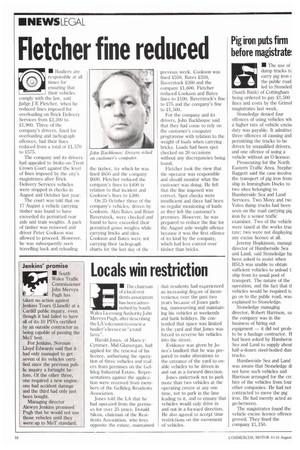Fletcher fine reduced
Page 20

If you've noticed an error in this article please click here to report it so we can fix it.
• Hauliers are responsible at all times for ensuring that their vehicles comply with the law, said Judge J E Fletcher, when he reduced fines imposed for overloading on Brick Delivery Services from £2,200 to £1,900. Three of the company's drivers, fined for overloading and tachograph offences, had their fines reduced from a total of 21,570 to 2575.
The company and its drivers had appealed to Stoke-on-Trent Crown Court against the level of fines imposed by the city's magistrates after Brick Delivery Services vehicles were stopped in checks in August and October last year.
The court was told that on 17 August a vehicle carrying timber was found to have exceeded its permitted rear axle and train weights. A pack of timber was removed and driver Peter Cookson was allowed to proceed. However, he was subsequently seen travelling back and reloading the timber, for which he was fined 2650 and the company 2600. Fletcher reduced the company's fines to 2400 in relation to that incident and Cookson's fines to 2300.
On 25 October three of the company's vehicles, driven by Cookson, Alan Bates and Brian Baverstock, were checked and found to have exceeded their pen nitted gross weights while carrying bricks and tiles. Cookson and Bates were not carrying their tachograph charts for the last day of the previous week. Cookson was fined 2350, Bates 2310, Baverstock 2260 and the company 21,600. Fletcher reduced Cookson and Bates tines to 2100, Baverstock's fine to 275 and the coinpany's fine to 21,500.
For the company and its drivers, John Backhouse said that they had come to rely on the customer's computer programme with relation to the weight of loads when carrying bricks. Loads had been spot checked on 20 occasions without any discrepancies being found.
Fletcher took the view that the operator was responsible and should monitor what the customer was doing. He felt that the fine imposed was correct. Spot checks were insufficient and there had been no regular monitoring of loads as they left the customer's premises. However, he was prepared to reduce the fine for the August axle weight offence because it was the first offence of its kind by the company, which had less control over timber than bricks.


































































































































